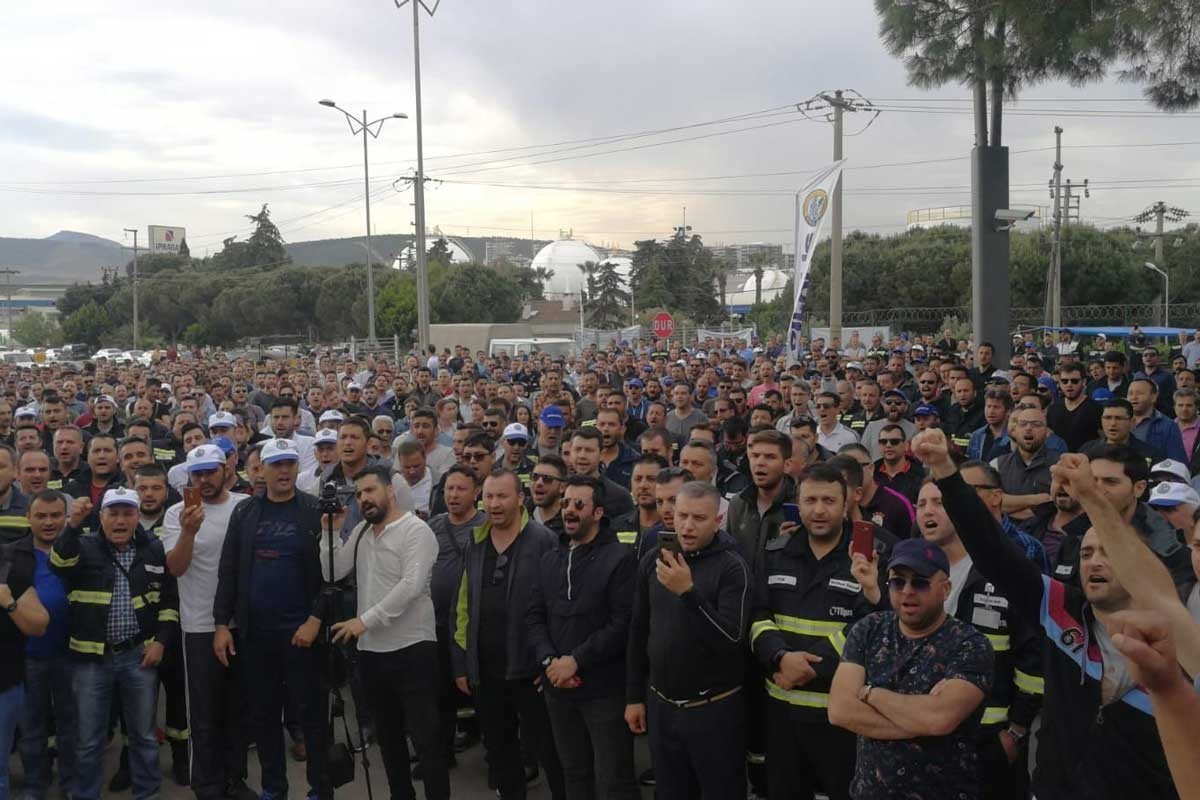The nose-in-the-air company and the workers who pay no homage
Able to measure the limits of their own strength, knowing the magnitude of the opposing force but not doing homage to that force – this is where the workers stand.

TÜPRAŞ işçileri
Fotoğraf: Evrensel
Turan KARA
Even if some days have a spring-like feel, the all-drying sunny days have begun. Fruit is appearing in the places where flowers bloomed on trees. Nevertheless, the multicoloured abundance of flowers in the gardens does not suffice to attract the bees here. There are white jasmines in almost every house, park and garden in Izmir and, given the chance, they wrap themselves round the trunk of a tree on the hillside and rise to the heavens. Honeysuckles or purple bougainvillea run riot around the iron on the garden walls. Aliağa is a sea town, but next-door Foça does not quite boast this degree of colour.
This is the Necmettin Giritlioğlu junction, where the workers wanted a statue symbolizing Necmettin Giritlioğlu while the municipality, as if to do the opposite, made a petrol pump statue representing the plant. One branch of the junction goes to the centre of Aliağa, another to PETKİM, while the other branch is the TÜPRAŞ turn-off.
Progressing along the TÜPRAŞ turn-off that also leads to the shipbreaking plant, the left-hand side is adorned with white steel balloons replete with hundreds of cubic metres of LPG and LNG as well as the gas filling plants of the İpragaz and Milangaz companies, while on the right-hand side are the single-storey, single-windowed buildings of the fuel transport agencies strung together ten at a time. The strong stench of tube gas that hangs heavily enough along the road to cloak a person and sometimes wafts as far as the city centre seven or eight kilometres away stays thick until noon. This smell, thinned out by the afternoon breeze, disperses if Izmir’s finest wind, the one from the sea, blows from afternoon until evening and then you breathe freshly. And the air finally fills with the relief and humid serenity the incoming sea breeze has created with the drops of water it has torn from the surface of the sea, and if you are lucky enough the smell of tube gas has been replaced by that of iodine. Today there is neither a light breeze nor does salvation from the inward sea wind appear to be in the offing. The overwhelming stench, like the one that hits you the moment you walk through the door and realize you forgot to switch off the tube, has permeated down to the ditches as far as the petrochemical plant turn-off.
Woodland, composed mainly of pine trees, bounds on the gas filling plant, virtually encroaching on the filling plant but set off with wire fencing. These days, anything but the normal routine applies at the wood-permeating petrol processing plant of Turkey’s first refinery. Instead of wireless-transmitted work orders, there is talk that is troubled but cheerful, concerned but carefree and angry at times but insistent, sworn to decisiveness.
TÜPRAŞ’s main entrance gate is abuzz with activity every day as huge tankers and vehicles enter and exit. This activity, redolent of a trail of ants, has now come to a halt from daytime to evening and will also come to a night-time halt in a few days. Unable to make sense of what is happening, the tanker drivers wait at the coffee shop to one side of the junction, saying, “We’re the ones who cop it. We end up waiting until evening. What’s picking up fuel in the evening instead of the daytime going to change?” The transport people, lorry drivers and vehicles that head to and fro as orders dictate are in silence, ignitions turned off, and the drivers wait for evening to come to fill up. Work has halted at the plant in the big wood whose produce they forever pick up.
TÜPRAŞ workers are frequently halting land fillings by day. As to ship fillings, they continue. The huge gas tanks inside TÜPRAŞ overfill every day with LPG, diesel, petrol, jet fuel, gas oil and fuel oil. If the tanks fill, the crude oil refining and distillation process, supposed to continue uninterrupted, halts. If these things take place unplanned then red alarm level is reached for the plant at which halts are spread over seven or eight days.
Right next to TÜPRAŞ in the woods, on the land that is also home to Çayağzı Cove, a unique cove that workers previously used as a recreation facility, the whole area has now turned into a construction and excavation site and PETKİM is there as its new refinery comes into existence. The Star Refinery, which PETKİM is bringing into being on the land it has rendered barren, boasts of being faster than the old and experienced TÜPRAŞ.
At the entrance to the PETKİM land that it owns virtually like a feudal lord, the Azeri SOCAR Holding company has had a glass company administration building some hundred metres tall built, from the tip of its nose to the ground resembling a small castle whose nose is stuck well up in the air and from whose top the entire Nemrut Bay is visible. The modern chateau cum new administration building is set apart from classical buildings by its oval and slanted top. The upslanted nose of the oval overlooking the bay appears to be pointing at you from wherever you look, from the filling plant owned by İpragaz and Opet on the hillside to TÜPRAŞ.
It resembles the broad nose belonging to large-headed folk with holes big enough to make breathing easy during cold and harsh weather. This long nose breathes air of all kinds here. Not just the tube gas smell that sits over the ditches, but also the naphtha and motor fuel and nowadays the all-too-pervasive smell of workers’ adrenaline, too.
If this nose belonged to a person, we could say that this person was looking at TÜPRAŞ from the tip of their nose on their head pulled back on the nape, their arms firmly clutching their chest with their hugely massive body tilted back slightly on their short and taut legs. Moving opposite and glancing, the tip of the nose, the most extreme point of the body of the upright person appears to cover the forehead. Can anyone say that looking with your nose in the air, the pig-headedness of people who desire to possess all, is not a monument to the culture of ruling through order and dictate rather than of rights, the law and equality?
These days, instead of the bustle of transport, the gate witnesses the workers with their insistent and resistant stance in the face of this kind of arrogance and pig-headedness.
The workers, previously invisible and inaudible, now want to make their united voices heard. Able to measure the limits of their own strength, knowing the magnitude of the opposing force but not doing homage to that force – this is where the workers stand. Activity to counter the hopelessness created by passivity, it is the endeavour to dispel this hopelessness.
The workers are like bees disturbed by the owner of the woods who wants to get the honey in the hive at these plants that do not belong to them but which they fill.
They are also objecting to the passivity and the rhetoric of “hopelessness” that is imposed on them, not just at the gate, but at the beehive-like workshops in the wood. The workers at the energy production plant at which products themselves the source of movement and motion are manufactured have come out of their hives because the boss who thinks himself the owner of the woods and in the workers’ eyes is “as bereft of knowledge as a shepherd when it comes to production” has veritably thrust a stick into the beehive.
The ant trails made up of tankers before the gate have now been replaced by the buzzing of bees that four hundred workers create daily. Although the number of TÜPRAŞ workers has fallen over the years, like all workers who have become expert at their job, they are dynamic and industrious workers. Now the only action before the gate and in the workshops inside is at their command. Action takes place if they want. If not, there is an unowned and empty wood. They are striving to drive home that neither production, nor work safety nor wellbeing and peace come about simply by setting up industrial plant. Their tolerance for provocation decreases further each day. They are charged with electricity.
Like bees expelled from the hive, the workers swarm around the trees and wood, walk as a body in front of the company building and gather in the canteen. Once evening comes, they gather to find a way to get back to their hives the next day.
The workers assembled in front of the gate are piqued at management, whom they have not met until now and who are relying on practices, pressure and impositions they have not witnessed elsewhere, and the refusal to grant them rights. Faced with the boss’s demeanour they find derogatory, they let nothing to rob them of their honour. What the boss is seeking is the destruction of TÜPRAŞ’s atmosphere that instils the feeling of being privileged in its workers. A worker, describing themselves as the private school brigade of the working class, says, “If, now, this is done to us here, who knows what’s being done to workers in industry. If they can grind us down here, who knows what they are doing in places where the unions are weak.”
Trying to make sense of what is happening, another describes the world they find themselves in thus: “In the new period, in the Ali Koç period, importance was given to the white-collar people with the blue-collar lot robbed of all prestige. The workers became a kind of rabble, stepchildren. A chasm opened, in terms not just of earnings, but of prestige and respect. The reason that these difficulties have now emerged is that the managers are all experts with their roots in finance. They don’t understand us, accept no objection and say the work will absolutely be done through shortcuts. There used to be managers with industrial roots who had been promoted here through the engineering route. Where we differ from the management is we still look through national wealth eyes and have statist roots (not government, mind you!), while the managers don’t see things this way and look at special calculations. For us, each worker working here, each staff member, is a secret hero. They notice all kinds of tiny detail and keep the business on its feet as best possible and look out for it. In their eyes, we’re a rabble who understand nothing and have no sectoral information.”
The workers are up against the boss who directly owns virtually all Turkey’s large enterprises and, indirectly, its small and medium-sized enterprises. And, at the same time, the drawbacks of the union they possess. They are for the first time experiencing a derivative of the experience PETKİM workers have had twice.






Follow Evrensel